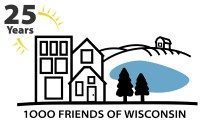Prepared by the Center on Wisconsin Strategy
Transportation is one of the biggest-ticket items for state and local government, as well as citizens and business. The cost is high, but so is misunderstanding of who pays for what. And that leads to bad political and market decisions.
MYTH: Roads in Wisconsin “pay for themselves” through user fees — gas tax, tolls, and licensing. The Wisconsin road lobby likes to pretend that users pay the cost of roads in Wisconsin: “Wisconsin has a history of funding its transportation system by charging the users of that system,” the road lobby’s Finding Forward coalition declares. What the lobby and others espousing this view don’t emphasize is that this statement only applies to the 10 percent of the road network made up of state-owned highways. The full picture is much different.
FACT: Roads in Wisconsin are heavily subsidized by taxpayers. Between 2004 and 2008, roads in the state cost an average of $4.24 billion annually. Of this, $1.74 billion came from revenue sources unrelated to road use — primarily property and sales taxes — while another $600 million was borrowed.
So, even counting federal aid as user-based – which is generally but not always true – between 41 and 55 percent of road money, depending on how borrowing is repaid, comes from non-users.
The fact is, roads constitute one of the biggest tax burdens around.
MYTH: Roads are being short-changed by diversion of user fees. The highway lobby wants a constitutional amendment that would require the state to devote road-user fees for transportation. “In order to ensure that user fees fund the system, the dollars need to be maintained in an account separate from general tax revenue,” says Finding Forward. Gov. Scott Walker would go even further and stop funding local bus systems with these revenues.
FACT: The cash flowing into roads from taxpayers far outweighs user-based proceeds going to non-roads. Averaging the money flow by household for illustration, each year roads consume $779 per household of non-user tax money. The comparable figures for user fees flowing to transit and other uses is $50 and $34, respectively.
If Wisconsin did fully fund its roads with gas taxes and other road-user fees, local governments would be awash in money, which they could use to fund transit and other services amply – while still giving citizens a break on property taxes.
To do that, keeping license fees constant, Wisconsin would have to raise the gas tax by at least 154 percent, or 51 cents per gallon.
| Data are for 5-year period, fy 2004-8 | ||||
| Revenues (Inflow) | Expenditures (Outflow) | |||
| Source | Amount | Expense | Amount | |
| User revenue | $6,393,111,691 | Capital (construction) | $9,371,741,000 | |
| Non-user revenue | $8,711,632,215 | Maintenance and services | $8,867,099,691 | |
| Federal | $3,101,715,000 | Debt service | $2,875,937,000 | |
| Borrowing | $3,018,250,000 | Total | $21,114,777,691 | |
| Total | $21,224,708,906 | |||
| Total user revenue collected also includes funds for non-road items (not included in figure above): | ||||
| User fee contributions to transit* | $562,073,000 | |||
| User fees for other purposes* | $428,549,000 | |||
| Total | $990,622,000 | |||
